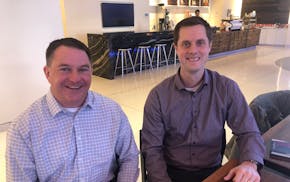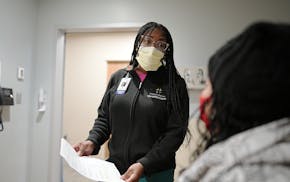Google this week pledged $1 million to five Minnesota social enterprises.
The five are winners of the Google.org Impact Challenge Minnesota competition launched last fall, which aims to innovate workforce development, environmental work, child care and other work.
A million bucks shared by these small nonprofits, selected by a panel of local business judges, is chump change for Google.
Alphabet, Google's parent company, is valued at $1 trillion by investors. It earned $34 billion over the past year and committed in 2017 to donate at least $1 billion in pretax profits over five years to environmental, educational, human rights and other organizations.
That amounts to about 1% of profits annually earned by Google.
But the $1 million donation by Google represents much more to the Minnesota nonprofits.
Each of the five Twin Cities agencies received $175,000. As grand-prize winner, Genesys Works Twin Cities, received an additional $125,000. There were more than 100 competitors.
"This is really important to us," said CEO Amanda LaGrange of Tech Dump, the several-year-old refurbisher and recycler of electronics equipment that employs about 60 people, including 80% who have a criminal history or chemical dependency problems.
"These dollars will help us significantly grow leadership training for supervisors. That has been a big, audacious goal," she said. "And a lot of our supervisors are former trainees who understand the challenges of 're-entry' " from jail to finding training, employment and housing while not violating parole, she said.
Tech Dump generates most of its $4 million in annual revenue from sales of refurbished laptops, phones and other products through its Tech Discounts business, and sales of recycled scrap.
"No way we could cash flow this from our business model," LaGrange said. "So this philanthropy is transformative. It will allow us to train a pilot group of about 20, and eight to 10 people who would go through this on an ongoing basis annually. Once we figure out the right curriculum … we might be able to work with other nonprofits."
LaGrange, a former financial manager at General Mills, joined Tech Dump out of a commitment to curb electronic waste and work with second chancers.
And Tech Dump, which works out of two locations, refurbishes or recycles 20,000 tons of consumer and office electronics annually.
Dan Harbeke, Google's Midwest public affairs leader, said Minnesota is helping Google learn how to make this kind of difference.
"We've only done a handful of Google 'impact challenges' in a handful of states so far,' Harbeke said. "And we had Minnesota judges make the decisions on the winners. We also are providing some technical and training support to nonprofits. We want these grants to be meaningful."
Genesys Works this school year has more than 350 low-income, disproportionately minority high school students working internships with Twin Cities companies that pay up to $14,000.
"With this investment from Google, we will expand our multiple-pathways programming for our young professionals, so that they can gain access to in-demand business technology opportunities," said Karen Marben executive director of Genesys Works Twin Cities. "These investments in Genesys Works enable us to more holistically equip our students to achieve economic success and break the cycle of generational poverty."
The $300,000 total award to Genesys Works is significant: It equals nearly 25% of its annual fundraising.
Since inception in 2008, Genesys Twin Cities and partner employers have provided 2,100 students with school-year internships that provided invaluable experience, including weeks of Genesys training, permanent jobs at good wages and college scholarships.
The three other nonprofit award winners were:
• First Children's Finance, which pools local resources, investments and public-private partnerships to increase the number of child care slots available to families in rural areas.
• Hmong American Farmers Association, which has launched a community-supported agriculture box that provides a weekly supply of locally grown food to low-income families in the Twin Cities.
• The BrandLab, which helps increase opportunities for young people of color to enter and succeed in marketing careers.
The local judges included Susan Marvin of Marvin Companies, Gersson Rosas of the Timberwolves, Tony Sertich of Northland Foundation, and former Minneapolis Foundation CEO Sandra Vargas, now a fellow at the Humphrey School at the University of Minnesota.
Google said last fall that in 2018, 20,000 Minnesota businesses generated an estimated $6.4 billion using Google's search and advertising tools.
Neal St. Anthony has been a Star Tribune business columnist and reporter since 1984. Reach him at nstanthony@startribune.com.

St. Anthony: 'Patient' investing paying off for St. Paul's Hill Capital

Jennifer Smith, leader of Burnsville's Innovative Office Solutions, has died

St. Anthony: Medical professions in Minnesota need more people of color in their ranks



